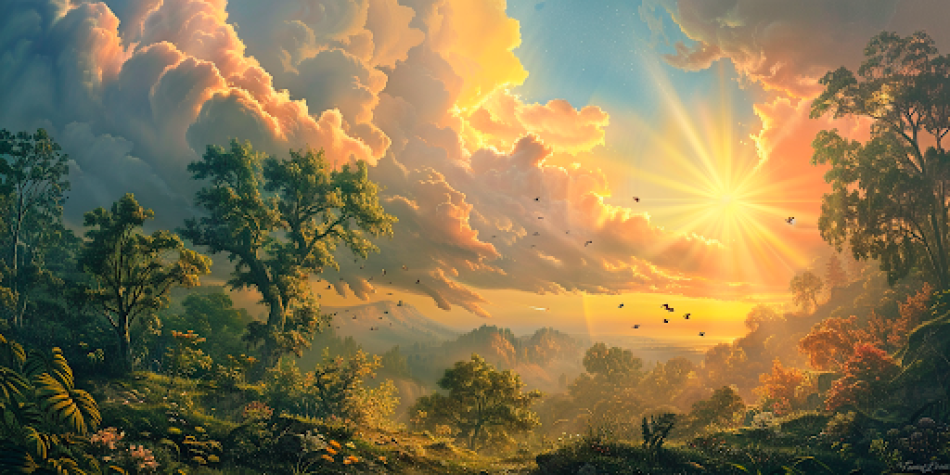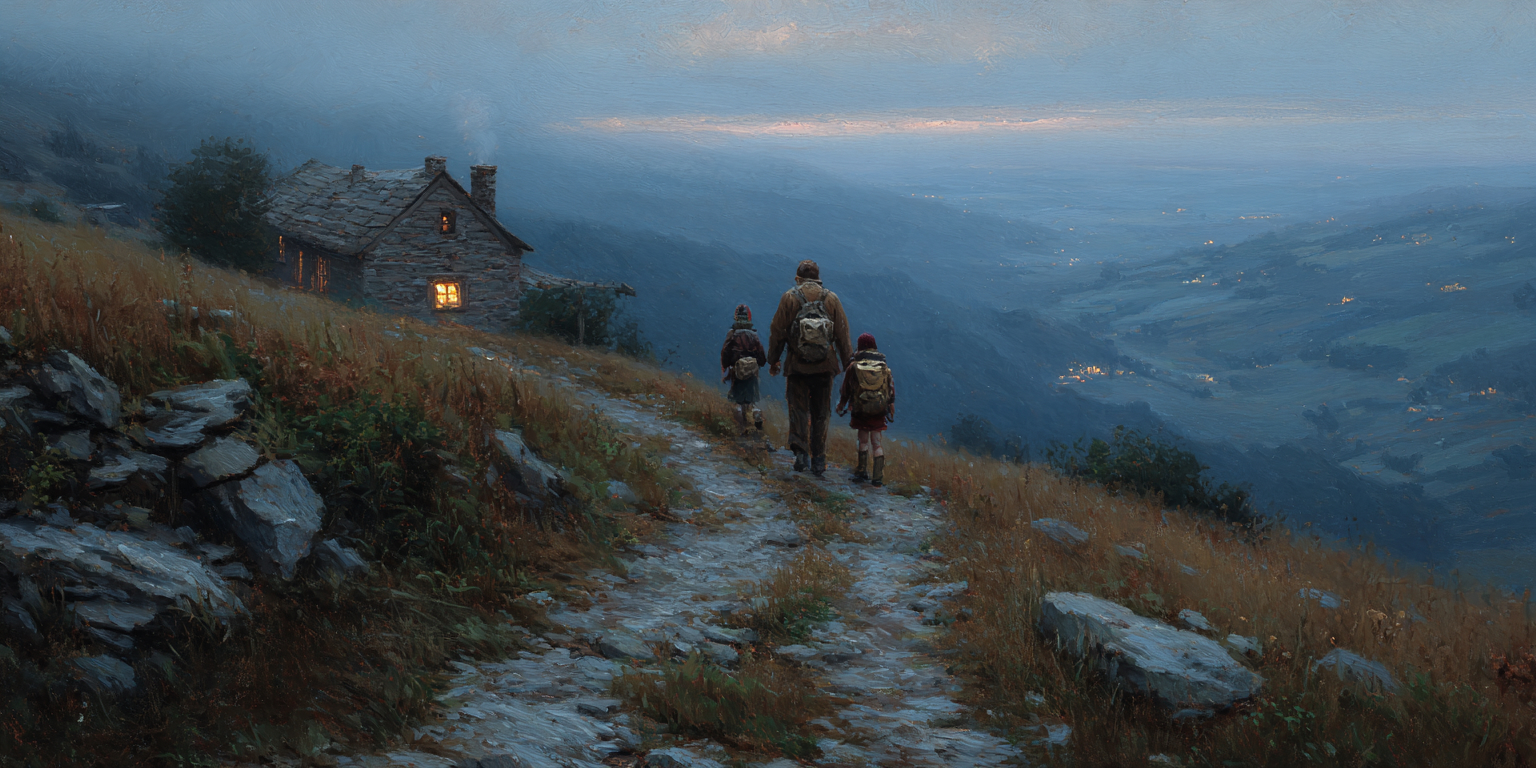This interview has been edited for length and clarity.
Public Square Magazine: You recently published a book called Purpose: What Evolution and Human Nature Imply About the Meaning of Our Existence. Can you tell us a little bit about the book’s main argument and why you decided to write it?
Sam Wilkinson: Yeah, I’d be happy to. The main arguments are that our coming into existence was not an accident and that the way that nature seems to have shaped us leaves us pulled in different directions in what we might call, in theological terms, good and evil. When we combine that with the sense and the experiences we all have that we can choose, this, to me, implies that the purpose of our existence is to test our character. Life is a test between the good and evil natures within us.
I wrote this book based on a personal experience I had when I was a young medical student. I was wrestling with a faith crisis, and I perceived a conflict between science and faith. However, in a way that was difficult to describe, things ultimately came together in a way that was very beautiful and had a lot of harmony in it.
PSM: Would you say that this book was written for someone kind of like you, someone who’s wrestling with the intersection of faith and religion, particularly around evolution?
Sam: Yeah, evolution has been a stumbling block for people of faith for a long time. To be clear, though, there are many before me who have lent their voices to try to bring these two worlds closer together. I just try to add and see if I can contribute in a unique way to that. What a lot of these people prior to me have said is that these two things can coexist peacefully. For me, I’m saying that not only can they coexist peacefully, but they also reinforce one another. At least, that’s how I view it.
PSM: I was impressed with how many times you were able to incorporate LDS concepts and language into the book. Things like the idea of “opposition in all things,” the idea of good and evil, and the notion that “life is a test.” Was this intentional or did this come out organically as you wrote the book?
Sam: I just think that this is a function of reality. Calling them unique LDS concepts is one thing, but I think they are just concepts of truth. I did not necessarily intend to spin it so it is “LDS-like.” I just see these terms as emerging organically from reality.
PSM: Some Latter-day Saints point to statements by certain church leaders who are opposed to evolution and conclude that good Latter-day Saints can’t believe in evolution. What do you say to them?
Sam: I would say that the official position is one of neutrality. I would point to other leaders with whom it was very clear that they believed in some form of evolution. David O. McKay had writings and thoughts about this. So, I understand where a lot of the hesitation comes from, but I think that what they’ve understood about evolution is not the complete picture. A more wholesome picture of evolution is going to be much more acceptable to a lot of folks who have been hesitant about this topic.
PSM: And what do you provide that is maybe missing from their picture of evolution?
Sam: Well, one of them is this notion of ‘randomness,’ right? When a lot of lay people think of evolution, they think, “Oh, it’s just totally random,” or it’s this haphazard thing. I provide what I think is compelling data from many scientists showing that, actually, this is not necessarily the case. This notion that life is an accident—I don’t think that’s true. But I think that has been part of the hesitation of people.
The other hesitation that people have is what the notion of evolution implies about human nature. So most people think that if evolution is responsible for shaping our natures, then we are ultimately selfish and greedy and hyper-sexual and so on. While there is some truth to that, it is not complete. There are many ways that it likely shaped us to be pulled in the opposite of those qualities. So those are two areas where I think that if people had a more holistic understanding of the issues around evolution, they would see that it actually makes sense.
There are some things that I don’t really get into in the book that have to do with the hesitation around evolution. For example, a lot of people wonder about the Fall and Adam and Eve. And I have at least the beginnings of answers to those questions, which will be very acceptable to people, even from a very traditional standpoint, even if I have not fully worked them out yet.
PSM: In several places in your book, you speak of “higher-order principles” that guide the process of evolution. Can you say a little bit more about what you mean by that?
Sam: There seems to be something leading evolution to go in certain directions and not others. A really important part is natural selection, also known as “survival of the fittest,” which says that the traits that are helpful for survival and reproduction are the ones that are enhanced and passed on. But there is more than just that. We don’t know exactly what it is. For instance, there are genetic sequences that spell out the recipe for proteins. There are instances where the exact same genetic sequences have developed independently in organisms that are not closely related. They originally split off from a common ancestor, but they independently developed the exact same genetic sequence. So we don’t know exactly whether it is God putting His finger in the primordial soup or that there are these natural laws that have guided it, or even, perhaps, a combination of the two. I don’t know what it is, but there is something going on here where it’s not just one random thing after the other.
PSM: I think I remember a moment from the book where you said that we share 40% of our genetic code with bananas or something like that.
Sam: That’s a figure that keeps getting passed around. It comes from this video that was produced for the NIH. But yeah, we have a lot in common with a lot of other things, so it is interesting.
PSM: It is! When I heard you talk about higher-order principles, initially, I thought you were talking about laws of nature that constrain and guide evolution in a particular way. I was thinking something like the gravitational constant or things like surface tension for water or principles of thermodynamics. There are just things about the way the world is set up such that certain things work out and other things don’t. In my view, those ideas seem like a secular scientist could just say, “Well, that’s all there is.” It could be portrayed as just random, depending on how you think about the universe. Maybe those things were just set in a particular way. And so again, it’s just kind of like a random path all the way down. I’m guessing that you would resist that, but could you tell me more about why you would?
Sam: I don’t necessarily disagree with that. The way one scientist put it is, “Biology is awaiting its Einstein.” Up until Einstein, we thought we had a complete understanding of something called Newtonian mechanics. You know, an object at rest remains at rest, and so forth. But it wasn’t a complete understanding, especially when you started approaching really fast speeds, and gravity gets mixed in it. More particularly when you talk about these cosmic distances and whatnot. These led to the need for relativity. You know, Newtonian mechanics works when things are moving relatively slowly compared to the speed of light, but Einstein came along and said, “No, there are more than these Newtonian principles, there are these other laws.”
This may be a bit like what’s going on with biology. Yeah, there is natural selection, but there’s something in addition, and we don’t know exactly what it is. So, I would not be opposed to us discovering that there are certain biological forms that spontaneously develop with natural laws. I don’t know whether God invented these laws or just mastered them and can use them. I don’t really care, to be honest. But I do think, somehow, there is a divine purpose and presence behind and involved in these laws. I think God works through the laws of nature, but we still don’t understand a lot about the laws of nature.

PSM: So I forget if you talked about this in the book, but you know the standard evolutionary theory is that everything goes back to one primordial organism or something like that. Do you think that, maybe, as we learn more, evolution will show that life evolved several different times?
Sam: Yes, I do. There are scientists starting to theorize about this. Part of this goes back to what’s known as “cell theory,” which has to do with abiogenesis. One of the fundamental tenets of cell theory asserts that living cells only come from other living cells. If I taught my 7-year-old that, he would say, “Well, what about the first living cell?” Scientists have essentially concluded that it was such a fluke event that it could only have happened once.
But then, when you see the non-randomness here, you say, “Well, why couldn’t that have happened more than once?” We already have these experiments from this guy Stanley Miller, who essentially showed how you could mimic the supposed environment of the Big Bang. And you have these gasses and such, and the amino acids will spontaneously form, right? So there have been several experiments showing how the building blocks of life spontaneously form. Some people will say, “Oh, that’s disconcerting cause it could show that you could do this without God.” I would frame it differently and say, well, God made the laws of nature in such a way that life can emerge spontaneously. Why couldn’t the genesis of a cell have happened more than once?
Now, there is a big gap between spontaneous amino acid formation and a cell popping out. And then there’s lots of interest in what is filling that gap, but there’s scientists who are thinking that it doesn’t necessarily have to be a single cell. In fact, it would make it more simple in some ways. These are scientists that don’t necessarily have a religious agenda.
So, whether it was one cell or maybe half a dozen cells, it seems like a trivial distinction. But if there were like thousands, then that might be interesting, right? And so this notion of non-randomness, I think, is just totally disruptive.
PSM: Getting back to non-randomness, it seems like there could be two kinds of non-randomness. The one is just that kind that is easily explained by the principles of physics and biology and chemistry, and then the other is what you were talking about earlier about the change in proteins which kind of spontaneously appeared. Should we believe that there’s some sort of higher order, meaning, or purpose behind that? Is it because there’s no other good explanation for why it keeps turning up?
Sam: No, No. I don’t think that’s right, at least for me. I don’t think that you’re ever gonna find a place in the genome where it says, “I, God, did this,” right? So we should be careful about that. This gets into what’s called “the God of the gaps.” This concept is that we find God in the gaps of our understanding. This is not a good principle for belief because, ultimately, science fills the gaps in our understanding. If God is resting in those gaps, then He gets pushed out as science fills them in. In my view, even miracles are explainable, ultimately. There are laws and principles to them. It’s not magic. A miracle can be conceptualized as something we don’t necessarily understand, but it’s not a breaking of natural laws. At least, that’s how I would see it.
PSM: You have a reference to James E. Talmage on this in the book.
Sam: Yeah, thank you for reading the endnotes! To me, I don’t necessarily see that division you just laid out where you have physics and chemistry so it could be that there are physical and chemical laws that are constraining it so that these identical proteins form independently. I don’t want to go beyond what we know and what the evidence points to. There is just a lot that we don’t know. In my opinion, though, it is beyond dispute that evolution was not a random and haphazard process.
So, I don’t know that you can find purpose and meaning in that aspect of it, but certainly, it makes a lot of room to say, “Oh, well, maybe it’s not just an accident that we are here.” Now, let’s go to human nature and dig into how nature shaped human psychology and behavior. Maybe we could find some answers there.
PSM: So, on that note, how much guidance does evolution give about how we should live? You note that evolution seems to replace tendencies towards both good and evil inside us. How do we know what is good and evil? Is it because one leads to survival and reproduction more reliably than the other? Or were there other criteria for figuring that out?
Sam: Yeah, so it’s a bit of a tricky thing to go to biology for morality, right? But one thing that I noted is this issue of what’s called the “levels of selection.” When you think about the survival of the fittest, we need to ask the question, survival of the fittest what? Are we talking about survival of the fittest individual or of the fittest family or group? And when you look at those different levels, the types of social behaviors that emerge are essentially in opposition. These two biologists put it just beautifully when they sum it up. They say selfishness beats altruism within groups, but altruistic groups beat selfish groups, and everything else is commentary.
There’s this story of two shipwrecks at the same time and place. There’s a group of islands about 300 miles off the coast of mainland New Zealand, and two ships wrecked here in 1864. But the islands are so large that they never learned of one another’s presence. The first ship was led by Thomas Musgrave. Fortunately, after 18 months, Musgrave and all of his crew survived. The second ship was led by a man named Dalgarno, and unfortunately, most of the crew from his ship died. What was the key difference? The key difference was that Musgrave’s group was incredibly cooperative, and this was demonstrated in the first minutes of the shipwreck when Musgrave himself carried an injured man on his back as he swam through the waves to the safety of the shore. Whereas Dalgarno’s group was incredibly selfish. They took an every-man-for-himself approach. They left a wounded man behind to die as they searched further inland for food and other resources.
So you can imagine similar scenarios in our distant past when it was cooperation, not selfishness, that led to improved odds of survival. There were likely, of course, circumstances in which selfishness was helpful. But there were probably lots of circumstances in which cooperation was better suited. And so pretty much everything that we think of as good, like in theological terms, comes from or is related to that group level or kin level of survival. Everything that we think of as evil comes from that individual level of selection.
The ultimate answer to what is good versus evil is that whatever the prophet and God say, that’s what’s good. But if you are looking for a first-order approximation, I think it’s a decent one to say that whatever is going to help the group or kin, even at the expense of the individual, that’s what we think of as good. And whatever is gonna help the individual at the expense of others, that is what we consider evil—selfishness, aggression, greed, lust, and so on. So, to me, that level of selection is an eternal truth. I mean, it’s not just in evolution but in group psychology, right? Groups that are cohesive—they are going to outperform groups that aren’t. So, I think that it’s an eternal truth. And you know, so many of the commandments, it seems like, are designed to help us live together in ways that are peaceful. It is not to take away our happiness for freedom, but they are given to maximize both individual and collective well-being and happiness in a way that will provide balance.
PSM: So it seems like that approach accounts for a lot of our duties towards others. I wonder if there’s another dimension of morality. Or maybe it’s just religion which has to do with our duties towards God. Concepts like holiness, obedience, reverence, and so on. Can evolution give a good account for those kinds of virtues or tendencies? Or is it just a different kind of thing?
Sam: Yeah, I don’t know. I haven’t thought about things like holiness and reverence. There are certainly some scholars in the social sciences and the biological sciences who say, “Well, religion evolved because it was useful,” and a lot of religious folks will take umbrage to that. I would say, “Well, do we have to?” God created us to be religious or at least to have a capacity for it, right? There’s some mechanism by which He did that, and if it happens to be evolution, I’m okay with that if it was helpful in some way.
So that’s maybe more of a general question. Is religion a product of evolution? Or did God put it into you and me? I don’t like the separation. I think evolution was, in large part, the mechanism by which we were created in the flesh. So, borrowing some logic from C.S. Lewis, if we have a sense of hunger, there’s such a thing as food. We know we have a desire for sex, and there’s such a thing as sex. We have a desire for God, and there’s such a thing as God. I’m okay if evolution was the mechanism by which God built within us these religious potentials (as well as hunger and the desire for sex). I haven’t thought about the particulars of it, like reverence and holiness.
PSM: Maybe it is the case that evolution is the mechanism by which we got to how we are. But, perhaps, the concern would be that evolution is not the best accounting of what’s going on with ideas like reverence or holiness. I think the standard evolutionary line would be, “We have it because it was useful for survival and reproduction, and, therefore, it was just another thing that helped us to evolve.”
An alternative line would say, “Well, that does not seem to be the best account of what’s going on when we are talking about reverence or holiness or something like that.”
Sam: Yeah, so some of that comes back to what’s called the hard problem of consciousness. We don’t have any idea how physical things like neurons and neurotransmitters somehow spring forth to non-physical things like thoughts and feelings. This is the hard problem of consciousness, and as far as I’m concerned, we are not anywhere close to solving it. I don’t think that we’ll be able to without some understanding of spiritual laws. But I can’t write that in a paper.
The philosophers will sometimes ask this question in the sense that it’s not at all clear why evolution would care about your inner world experience, right? And they’ll come to these questions when they talk about consciousness. They’ll use this construct called “meaning zombies,” which are essentially soulless creatures that are impossible to distinguish from real creatures. They have no inner experience. So, a meaning zombie looks and acts like a human but has no consciousness or soul or spirit. But, they behave in ways that would further their survival and reproduction. So evolution can’t really account for feelings at all. They can account for behaviors that we link with feelings. I mean, love feels good, you know. I love my kid. There’s an essential evolutionary explanation for why I’m gonna look after my kid, but the feeling of love, or the concept of seeing red or orange in the sky, is in some sense unknown. We have no idea how that perception works. The perception that salt tastes salty or sugar tastes sweet. It makes sense that I would want to eat sweet things because they have calories, but that’s just behavior. It cannot account for the inner perception and the inner reality or consciousness. What is going on? I don’t know if that’s a great answer, but that’s what I got.
PSM: No, that’s great! It actually leads to another question I have. Is there anything about human nature or the meaning of life for which evolution cannot give a good accounting? It sounds like consciousness is one of those things.
Sam: Yeah, it can’t really give an account for consciousness. Certainly the behaviors that we often link with consciousness, right? I mean, you’re going to seek out things that are rewarding, that feel good and avoid things that are painful. But consciousness itself is still a great mystery. As far as I’m concerned, evolution has not really added a whole lot to that. So that would probably be the biggest thing. And I think that’s related to some of the other things like complex music and advanced mathematics. But I’m okay if we eventually figure out the mechanism by which music developed. There is a mechanism. I believe in a God of mechanisms. And there’s some way in which this was all done, and if evolution happens to do the lion’s share of the lifting, then I’m okay with that. But it wasn’t random, that’s for sure.
PSM: Is there anything else about evolution or your book that you would want prospective readers to know?
Sam: I think the proper perspectives on evolution are very profound. Empirically, relationships are the most important factor for human happiness and well-being. And if, on some level, evolution is responsible for this, then the relationships that matter most are with those with whom we share our genes—for better or worse. Our family relationships are critical to mental health, well-being, and flourishing. I think that’s a function of the way we were created. It’s how we are evolutionarily and psychologically engineered.











